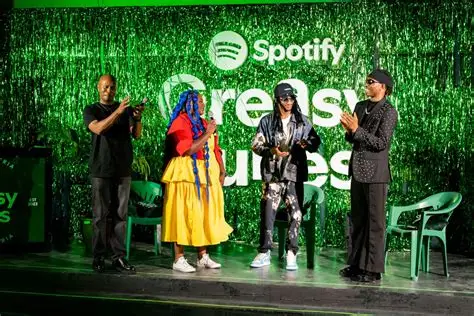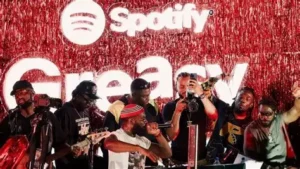Greasy Tunes & Green Beats: How Spotify Is Deepening Its Roots in Nigeria’s Music Culture
On a warm Lagos evening, where the hum of traffic blends with the pulse of Afrobeats, Spotify’s new cultural experiment comes to life. The streaming giant’s Greasy Tunes Café pop-up, launched in October 2025, is more than just a marketing activation it’s an immersive experience designed to fuse music, food, and lifestyle. For three weeks, the space operates as a hybrid restaurant-studio-gallery, where curated playlists accompany each dish, and every table is a node in Nigeria’s expanding streaming universe.
What the Project Is About
Greasy Tunes Café is part of Spotify’s ongoing strategy to localise its global brand in high-growth markets like Nigeria. Built around the insight that music and food are two of Gen Z’s strongest cultural identifiers, the café features a rotating menu inspired by Lagos Street cuisine, served alongside thematic playlists reflecting the city’s sounds. Each visit connects the tactile pleasures of eating with the sonic world of Afrobeats, Amapiano, and Alté.
Spotify Nigeria’s marketing team describes the initiative as a celebration of “the heartbeat of Lagos” where rhythm and flavour co-exist. The event has hosted live sessions, DJ sets, and meet-ups with young creatives, extending the digital brand into physical culture.
According to Music in Africa, the campaign was built on recent data showing that Nigeria remains one of Spotify’s fastest-growing streaming regions, with users under 30 making up the majority of new sign-ups.
Why It Matters for the Industry
This isn’t the first time Spotify has launched a cultural crossover, but the Nigerian iteration feels distinct. For years, the platform has used local activations to humanise its presence from “Spotify Wrapped” murals to collaborative playlists with regional artists. Yet Greasy Tunes Café marks a deeper pivot: embedding the brand in lived experience rather than digital data.
The logic is strategic. In markets where streaming competition is rising Boomplay, Apple Music, Audiomack, and YouTube Music the winning platform will be the one that understands not only what users play but how they live. By situating music in a physical, social environment, Spotify is positioning itself not merely as a service, but as a lifestyle companion.
Afrobeats at the Core
Afrobeats remains the engine behind Nigeria’s musical globalisation, and Spotify’s activation reinforces that narrative. The playlists curated for the café highlight a generational spread: from Tiwa Savage and Burna Boy to Bloody Civilian, Fave, and Odumodublvck. Each rotation captures the multiplicity of modern Nigerian sound glossy pop, street-born energy, and diasporic inflections.
The approach mirrors how Afrobeats itself travels through shared experiences and hybrid spaces. In tying food to sound, Spotify is effectively saying: to taste Lagos is to hear it.
Industry observers also note that such activations strengthen Spotify’s relationships with local labels and promoters. The platform’s editorial team in West Africa has become increasingly visible, often spotlighting emerging acts and regional subgenres such as Street Pop and Afro-Fusion. Greasy Tunes serves as a tangible showcase of that ecosystem.
Cultural Critique: Marketing or Movement?
Still, the initiative raises legitimate questions about the fine line between cultural investment and brand performance. While Greasy Tunes Café undoubtedly celebrates Nigerian creativity, some critics argue it’s primarily a marketing spectacle aimed at deepening user loyalty.
Platforms like Spotify walk a delicate path they must engage communities authentically while avoiding the impression of corporate appropriation. A temporary café in Lagos’ trendiest district may not directly impact the everyday struggles of local artists seeking better royalties or infrastructure. Yet it does offer a stage where local sound is globally contextualised, and that visibility has tangible value.
What differentiates this activation from superficial brand campaigns is its co-creation model. Local chefs, curators, and DJs were part of the process, giving the event a communal texture rather than a top-down gloss. In an economy where creative labour is often undervalued, even symbolic collaborations can shape perceptions of respect and recognition.
The Audience Response
Early reactions have been overwhelmingly positive. Nigerian social media feeds filled with images of attendees eating suya sliders and scanning QR codes to unlock custom playlists. For younger fans, the event merged two emotional comforts, food and sound in a way that felt authentic and new.
Many saw it as proof that global brands can adapt meaningfully to local culture when they invest in storytelling and experience rather than generic advertising. Others appreciated how the event gave a sense of ownership to local audiences Spotify didn’t just bring a global product; it built something unmistakably Nigerian.
Broader Implications
Greasy Tunes may look like a lifestyle experiment, but its implications ripple through the wider streaming economy. As international platforms expand across Africa, their ability to localize meaningfully will determine long-term dominance.
By connecting digital listening habits to real-world experiences, Spotify is effectively creating emotional loyalty the kind that algorithms alone can’t buy. It’s a reminder that, in an age of data and automation, culture still requires presence.
In the end, the Greasy Tunes Café represents a pivotal shift in how streaming services see emerging markets. Nigeria is no longer a passive consumer base but a cultural capital whose trends shape global sound.
If Spotify’s pop-up proves anything, it’s that the future of streaming in Africa isn’t just about distribution it’s about immersion. Music doesn’t live only in headphones or charts; it lives in shared spaces, meals, and memories.
For Lagos, that’s business as usual. For Spotify, it’s a lesson learned that to truly belong, you have to join the rhythm, not just stream it.



Leave a Reply